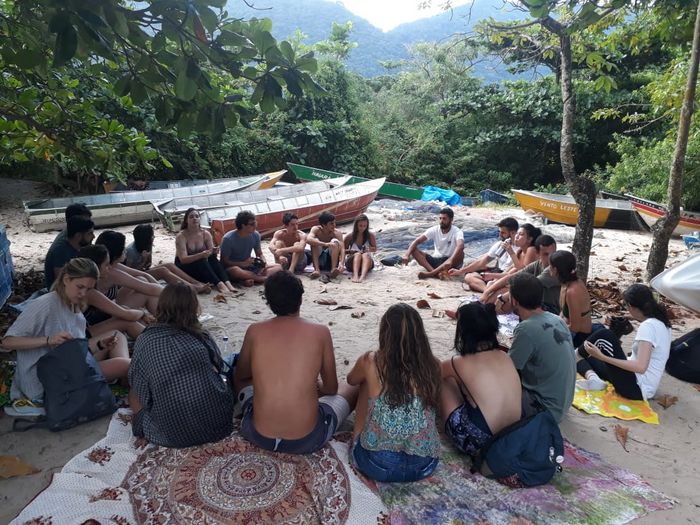The majority of Brazilians have so far shown little interest in community-based tourism. There is little awareness of what it represents in terms of social equality, human rights, cultural identity and environmental protection. Educating the internal market is a slow process and there are no positive signs in this regard, yet. While domestic tourism is generally seen as an option during the pandemic, from the perspective of many traditional communities in Brazil, at the moment the risks seem bigger than the opportunities.
Community-based tourism (CBT) has flourished in Brazil thanks to strong institutional support by the Lula da Silva government about ten years ago. For traditional communities, it has been first and foremost a political tool to affirm their identity and to uphold their very right of existence on their land. Cultural appreciation and nature conservation have always been their priorities. The Salvador Declaration, signed at the end of the II Global Forum on Sustainable Tourism in 2018, confirms the communities’ commitment to “contest hegemonic forms of conventional and mass tourism that often present themselves as non-sustainable: segregating, predatory and invasive against people, their environment and their cultures”. While well supported and celebrated within social and political movements and networks, Brazilian CBT has grown in a sort of self-elected form of commercial isolation within the tourism industry.
CBT has mainly survived in niches of the domestic market, while international visitors play a marginal role. “The majority of our tourists are from local schools and several national universities”, says Maria Aparecida de Alcântara, executive secretary of Rede TUCUM, a well organised CBT network established in 2006 in the state of Ceará. Nationwide, educational and scientific tourism together with social tourism, organized by non-governmental organizations have represented the major stream of tourists for CBT initiatives, strengthening their cause and social projects, but not really supporting them as a business.
Responsible, but not viable
Even if CBT is to remain a secondary activity to protect and prioritise the traditional activities and lifestyles of the communities, it still needs to be viable. A regular flux of national and international responsible tourists would be good to support their causes and their economies, but this would need the involvement of other actors along the supply chain.
However, Brazil is a huge country and many traditional communities are not easy to reach. For example, the Quilombolas (descendants of former slaves) settled in hidden and remote locations, while the Caiçaras (descendants of indigenous peoples and the Portuguese) and the Ribeirinhos (who live by the rivers and the sea) could, depending on the region, be reached by covering long distances on foot. For the indigenous Ribeirinhos, and other traditional communities living in the Amazon region, transportation only happens on water, the rivers being their only “roads”.
Because of the high costs and the difficulties of the transportation, CBT, in the majority of cases, is not a lucrative business for tour operators. In addition to that, the lack of marketing, communication, negotiation skills, and professionalism also leave many projects at the level of subsistence and unviable from a business perspective. The risk of exploitation and past negative experiences has made networks like Rede Nhandereko - on the coast between Rio de Janeiro and São Paulo - rely on their own independence. This has generated excellent results in strengthening every community’s identity and, also, the relationships among the traditional communities of the region.
Accessible, but in danger
For communities in more accessible locations, the relationship with the domestic ‘sun-and-beach’-tourist has not merely been one of neutral invisibility, but has so far been extremely negative. In the coastal region between Rio de Janeiro and São Paulo, communities are currently suffering an actual “invasion” of urbanites who have moved to their summer houses, as reported by Nei, a member of the community in Ubatuba. In 2019, Robson from the coastal Caiçara community of Trindade in Paraty, had already reported issues with irresponsible tourists: “Here we highlight the importance to listen to the sea and to the wind, everything speaks. Then you have these mass tourists that come with their loud speakers and you are not even able to hear the person sitting next to you. They are not interested in having an interaction with us that we live here. We would love to talk about the fishes, our boats, our traditional fishing technique, but they are simply not interested. They come here just to have fun. Not mentioning the litter that they leave behind that we have to clean from our beaches”.
Extra pressure under COVID
The COVID pandemic has created extra pressure on local communities, many of which today are functioning in survival mode. The situation is escalating for communities living in accessible areas of natural beauty, which are popular with tourists. They are not exempt from the risks of COVID-19, but have been left alone to fight the increasing influx of tourists. The communities from Paraty reported that they have created defensive barricades on the roads to their settlements, but many tourists simply ignore the signboards of ‘no trespassing’.
Thankfully, in some places municipal governments have provided support to some CBT initiatives, like the communities of the network Rede TUCUM in the state of Ceará, to better cope with the new health and safety requirements. At central level, though, the government has not put in place special measures that could protect traditional communities and prevent undesirable and unsafe ‘tourist invasions’. Moreover, it has too often assumed a blind attitude, and even allowed illegal and inhuman aggression against communities, as in the case of the deforestation of the Amazon and many other illegal activities that seem to have increased considerably during the pandemic.
There is hope
Currently, many of the communities are still closed to visitors, or very slowly and cautiously try to adapt to the new situation. Responsible local tour operators could be great partners, investing in building a more resilient post-COVID world. They might turn their interest to CBT following recent market trends, such as the search for pristine nature far from overcrowded cities. However, new relationships need time, especially because their trust has been broken so many times in the past. There is a need for readjustments and co-designed solutions to be created.
The rediscovered interest in nature, nature-based activities and immersive experiences in different lifestyles is increasing to different degrees in domestic markets around the world. There is hope that this will lead to local development and community empowerment and not just be another way of exploitation of people and places. At the moment, however, domestic tourism does not represent a reliable option for CBT projects in Brazil. At least, not yet.
Elisa Spampinato is a Community Storyteller, CBT expert and Sustainable Tourism Ambassador. CEO & Founder of Traveller Storyteller. She lives in London.
Further information:
Sustainability Leaders Project (2020): Elisa Spampinato on Community-Based Tourism in Brazil and Coping with the Pandemic.
Elisa Spampinato (2020): Lessons from the Circle: Reflections on the Brazilian CBT. Traveller Storyteller.
Elisa Spampinato (2020): Transformational Exchanges. Traveller Storyteller.



